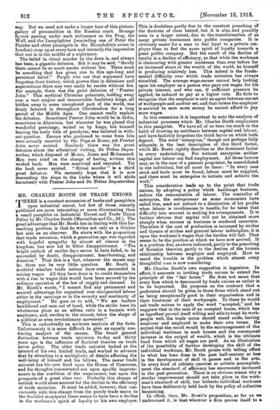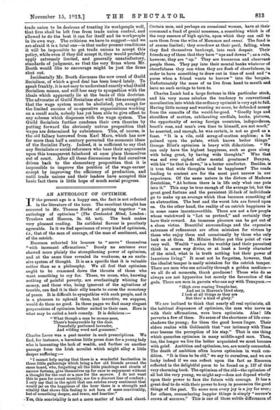MR. CHARLES BOOTH ON TRADE UNIONS.
THERE is a constant succession of books and pamphlets upon industrial unrest, but few of those recently published are more interesting or more illuminating than a small pamphlet on Industrial Unrest and Trade Union Policy by Mr. Charles Booth (Macmillan and Co., 2d.). The great advantage that Mr. Booth has in dealing with this far- reaching problem is that he writes not only as a thinker but also as an observer. He starts with the proposition that trade unionism, which a generation ago was regarded with hopeful sympathy by almost all classes in the kingdom, has now led to bitter disappointment. " The bright outlook of earlier days seems to have faded, to be succeeded by doubt, disappointment, heartburning, and disunion." That this is a fact, whatever the causes may be, there can be very little question. Mr. Booth is doubtful whether trade unions have even succeeded in raising wages. All they have done is to credit themselves with a rise in wages that would have been secured by the ordinary operation of the law of supply and demand. In Mr. Booth's words, " I cannot find any permanent and assured advantage for organized over unorganized labour either in the earnings or in the security and continuity of employment." He goes on to add, " We see leaders bewildered and men out of hand, while the strike loses its -wholesome place as an ultima ratio in a bargain with employers, and, swollen to the utmost, takes the shape of a political or even revolutionary movement."
This is undoubtedly an accurate analysis of the facts. Unfortunately it is more difficult to give an equally con- vincing analysis of the causes. The broad general distinction between trade unionism to-day and thirty years ago is the influence of. Socialist theories on trade union policy. The older trade unionist looked at the interest of his own limited trade, and worked to advance that by attending to a multiplicity of details affecting the well-being of himself and his fellows. The newer trade unionist has his eyes fixed upon the House of Commons, and his thoughts concentrated not upon specific improve- ments in the condition of the wage-earner, but upon the prospects of a great class war. Probably this change of outlook would alone account for the decline in the efficiency of trade unionism. It must be added, however, that con- currently with this change from the purely trade union to the Socialist standpoint there seems to have been a decline in the workman's spirit of loyalty to his own employer.
This is doubtless partly duo to the constant preaching of the doctrine of class hatred, but it is also, and possibly
even to a larger extent, due to the transformation of so many private businesses into public companies. It is- obviously easier for a man to feel loyal to a private em- ployer than to feel the 'same spirit of ' loyalty towards a great public company. But the result of the decline of loyalty is a decline of efficiency, so that while the workman- is clamouring with greater insistence than ever before for an increased share of the wealth of the world, he himself is producing relatively less. This indeed is the funda- mental difficulty over which trade unionism has always stumbled. The average wage-earner cannot help looking upon his employer as a person who pays out wages for his private interest, and who can, if sufficient pressure be applied, be induced to pay at a higher rate. He fails to recognize that the employer is only an agent between one set of workpeople and another set, and that unless the employer is assisted to earn more money he cannot afford to pay more wages.
In this connexion it is important to note the analysis of industrial processes which Mr. Charles Booth emphasizes in this pamphlet. We have all of us been too much in the habit of drawing an antithesis between capital and labour, and have foolishly forgotten the third factor on which both depend. The word "enterprise," though not perhaps fully adequate, is the best description of this third factor. which Mr. Booth rightly describes as the dominant factor in every undertaking. For without enterprise neither capital nor labour can find employment. All three factors may, as in the case of a peasant proprietor, be consolidated in one individual, but all must be there : " In every case stock and tools must be found, labour must be supplied, and there must be enterprise to initiate and achieve the work."
This consideration leads up to the point that trade unions, by adopting a policy which handicaps business, reduce the remuneration of labour. The controller of enterprise, the entrepreneur as some economists have called him, need not submit to a diminution of his profits when labour is troublesome to handle, for he takes that difficulty into account in making his arrangements. It is further obvious that capital will not be obtained more cheaply when success in business is rendered uncertain. Therefore if the cost of production is increased by strikes and threats of strikes and general labour indiscipline, it is upon the workmen's wages that the burden will fall. That seems to be the position at which we have now arrived. It is a position due, as above indicated, partly to the preaching of Socialist theories, partly to the decline of the human relationship between employer and employed. How to mend the trouble is the problem which almost every thoughtful man is now considering.
Mr. Charles Booth's own suggestion is ingenious. In effect, it amounts to inviting trade unions to extend the principle of the " fair house." He does not mean that every firm which is denounced by trade unions as unfair is to be boycotted. He proposes on the contrary that a preference should be given to those firms which stand out as being exceptionally good in their organisation and in their treatment of their workpeople. To these he would ask trade unions to apply the word "accepted," and he suggests that in the case of an accepted house, which has ex hypothesi proved itself willing and able to treat its work- people well, the trade union should stand aside, leaving employer and employed to make their own terms. He argues that the result would be the encouragement of the individual workman in such houses and the consequent increase in the output of wealth, which is the ultimate fuud from which all wages are paid. As an illustration of the possibility of further developing the skill of the individual workman, Mr. Booth points with telling effect to what has been done in the past half-century or less in the development of skill in games and in the arts. In every kind of athletic exercise or artistic accomplish- ment the standard of efficiency has enormously increased in the past generation. There is no obvious reason why a similar improvement should not take place in the work- man's standard of skill, but hitherto individual workmen have been deliberately held back by the policy of collective bargaining.
In effect, then, Mr. Booth's proposition, so far as we understand it, is that wherever a firm proves itself to a trade union to be desirous of treating its workpeople well, that firm shall be left free from trade union control, and allowed to do the best it can for itself and its workpeople in its own way. The criticism we have to suggest—and we are afraid it is a fatal one—is that under present conditions it will be impossible to get trade unions to accept this policy, while even if they did accept it, they would probably apply extremely limited, and generally unsatisfactory, standards of judgment, so that the very firms whom Mr. Booth would like to encourage might be just the firms shut out.
Incidentally Mr. Booth discusses the new creed of Guild Socialism, of which a good deal has been heard lately. To speak frankly, it is not easy to understand exactly what Guild Socialism means, and still less easy to sympathize with the ideals which apparently lie at the basis of this doctrine. The advocates of Guild Socialism start with the assumption that the wage system must be abolished, yet, except for the limited success of co-operative organisations working on a small scale, nobody has yet been able to give effect to any scheme which dispenses with the wage system. The Guild Socialists further condemn their own theories by putting forward the obviously untrue proposition that wages are determined by subsistence. This, of course, is the old fallacy borrowed from Karl Marx, which has now for more than half a century perverted the economic ideas of the Socialist Party. Indeed, it is sufficient to say that any Socialists or social reformers who base their arguments upon this transparent falsehood at once place themselves out of court. After all these discussions we find ourselves driven back to the elementary proposition that it is impossible to improve the position of the wage-earner except by improving the efficiency of production, and until trade unions and their leaders have accepted this basic fact there is little hope of much social progress.































































 Previous page
Previous page